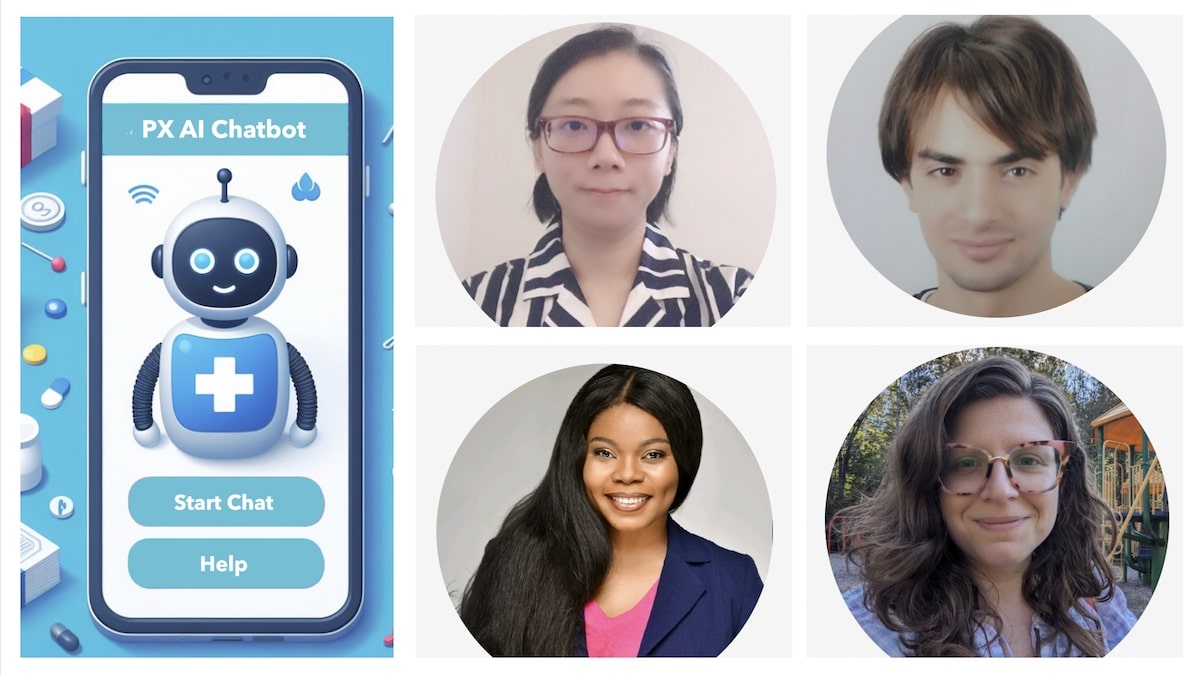Watson graduate students implement AI in healthcare practice as final project
Development team to present research at renowned conference

Binghamton graduate students are known for their dedication to the fields they pursue, but it’s not every day they take their work straight from the classroom to the conference room. Yet, that is exactly what three students at Watson College’s Department of Systems Science and Industrial Engineering (SSIE) have done.
“This research project started from a final project of the Human Factor class, which introduced some user study methods that we have utilized in our research,” said Vision (Xin) Wang, a systems science doctoral student leading the project. “We were interested in natural language processing applications in the healthcare field. After reading a lot of related literature, we found an application might help communication between the hospital and patients. We are happy that the final project of this class allowed us to apply the knowledge that we learned to real research.”
The Association of Computing Machinery (ACM) CHI conference on Human Factors in Computing Systems is the premier international conference on human-computer interaction and one of the top-ranked conferences in computer science. The Binghamton research team will present the work they’ve completed at the conference, which takes place in Honolulu, Hawaii, this May.
“The CHI conference has a high global impact in the field, and it only has a 24 to 26% acceptance rate,” Wang said. “Presenting our work at CHI can help strengthen our university’s brand and can encourage our community to continue contributing to this research area. The CHI conference will be a great opportunity for us to connect with other researchers and organizations who are interested in our future work.”
The team of doctoral students — Wang, Samer Abubaker and Grace Babalola — and SSIE Assistant Professor Stephanie Tulk Jesso collaborated with United Health Services (UHS) to co-design an artificial intelligence chatbot to improve patient experience in the hospital.
The team began by interviewing the human-centered patient experience team at UHS and found that artificial intelligence could collect data, fill a crucial gap and help patients in real time. Then, by reviewing patient reviews from hospital profiles on Google Maps, they performed a qualitative analysis and developed three AI techniques to code natural language from patients. The resulting patient-facing chatbot recognizes complaints and can respond in natural language.
“Patients visit hospitals to get healthcare services, where they will interact with doctors, nurses and staff, and use hospital facilities,” Wang said. “When patients want to give their feedback on a real situation that they encounter in the hospital, they can scan the QR code in each room to talk with the chatbot. The goal of our AI is to help the hospital to improve the patient experience in real time.”
Though every program has problems they must overcome — like coding patients’ reviews with the same understanding as human investigators, enabling chatbot applications to have more human-like responses and engaging patients in longer interactions to learn more about their experiences —the team is confident that fulfilling the human-centered designs of the study will improve overall hospital outcomes.
“Healthcare organizations are adopting ‘high-tech’ tools like AI for various reasons. While these tools show promise, many things can go wrong if they are not well suited for human use within these highly complex socio-technical systems,” Jesso said. “We believe that human-centered design is the key to better products that support humans as they work.”
Another common concern, privacy, is also being addressed. Since the chatbot may be exposed to sensitive user data during the conversation, the team is developing a topic-filtering feature to avoid specific conversations that could lead users to leak personal information.
Along with other members of the SSIE Department, the team will continue their UHS collaboration, in the hopes that they can refine the program and continue to implement the tool’s use far into the future.
“No one goes to the hospital on their best day,” Jesso said. “Collecting patient information (PX) can be crucial in ensuring that patients have dignity and comfort as they endure whatever life has thrown their way, and is crucial to help hospitals recognize where they can improve their services to ensure the best possible experience.”
